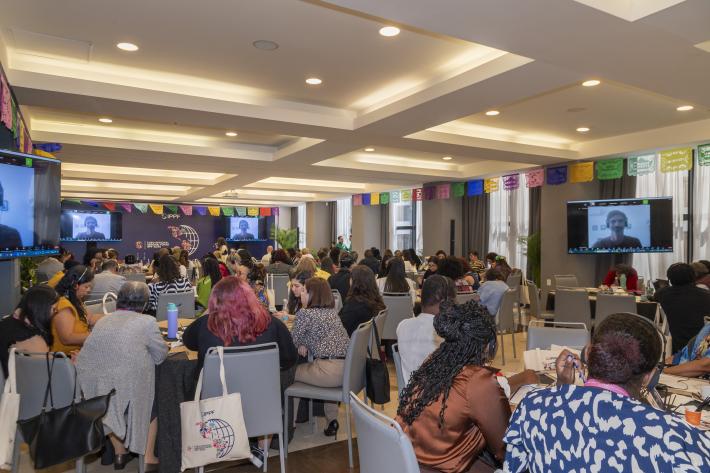Latest press releases
A selection of stories from across the Federation
Americas & the Caribbean
Breaking: IPPF Global Research Exposes Devastating Impact of the Trump Administration
Over Half of Partners and $85 Million Affected
For media enquiries


| 17 May 2024
INPPARES and IPPF's position on Peru's Supreme Decree Nº 009-2024-SA
All LGBTQI+ people in Peru and in the Americas and the Caribbean have the right to lives free from violence! In recent months, IPPF ACRO Member Associations, Collaborating Partners and the IPPF ACRO Secretariat have witnessed how some governments in the Americas and the Caribbean, even some that have historically acted to protect and advance human rights, have become the main opponents of people's rights, freedom and self-determination. So, after writing about our concerns about the new Argentinean government, today, on the International Day Against LGBTIQ+-Phobia, we want to demonstrate our strong concern with the actions of the government of Peru, which undermine the fundamental rights of LGBTIQ+ people. The IPPF Americas and Caribbean Regional Office joins INPPARES, Member Association in Peru, in expressing its rejection of the Supreme Decree Nº 009-2024-SA issued last May 10th by the Peruvian Ministry of Health which, by updating the Essential Health Insurance Plan (PEAS) based on the 10th revision of the International Classification of Diseases (ICD-10), violates the human rights of LGBTIQ+ people. Some context: The PEAS contains the list of interventions that can be addressed by health insurers in Peru, so it is vitally important that it is kept up to date with the guidelines and standards set by the World Health Organisation (WHO). From time to time, the WHO revises its International Classification of Diseases (ICD) to update it based on recent scientific evidence and thus adequately guide global clinical practice. Recall that in 2019, the 11th revision of the ICD made history by removing trans identities and expressions from the chapter on ‘Mental and Behavioural Disorders’. However, last week, the government of Peru decided to use an outdated revision of the ICD, which pathologises sexual orientation and gender identity. This decision of the Peruvian government to use ICD-10 is very serious, as it violates binding codes and agreements at local, regional and international level. On the one hand, it violates the constitutional right to health established in articles 7 and 9 of the Political Constitution of Peru, which establishes the right to health on the basis of equality and non-discrimination. Furthermore, it disregards the information, guidelines and standards of the WHO, the United Nations specialised health agency, and the requests of the Office of the UN High Commissioner since 2015 to stop the pathologisation of LGBTIQ+ people, in particular trans and intersex people. It also goes against commitments adopted by Peru in numerous regional and international declarations, such as the Montevideo Consensus, whose implementation and follow-up was officially adopted in 2016 by Supreme Decree N° 051-2016-PCM. Today, it is necessary to reaffirm that LGBTIQ+ people have the right to live free from violence, to live their gender identity and sexual orientation freely, to access health and reproductive services where their identities are respected and their specific needs are met. It is the responsibility of governments to ensure that these rights are fulfilled.

| 16 October 2023
IPPF ACRO express concern over guidance of the Zambian Ministry of Health who advised against the use of the term “sexual and reproductive health and rights”.
At a time of profound and multiple crises, it is worrying that the focus of any government's action is to go back on already consolidated international commitments, particularly those which recognize, based on evidence, that Sexual and reproductive health and rights (SRHR) are fundamental human rights, central to eradicating poverty and achieving sustainable development across its social, economic, and environmental dimensions. SRHR – which encompasses a range of issues, including universal access to SRH services and supplies, comprehensive sexuality education, and ending gender-based violence and harmful practices such as early, child and forced marriage – are fundamental to the ability of all people, especially women, adolescent girls and young people, to lead full, satisfying, healthy and productive lives. SRH services are a critical aspect of SRHR, but a complete understanding of sexual and reproductive health and rights goes far beyond on access to health facilities and services to include an array of social, legal, institutional, and financial arrangements that enable individuals to exercise their rights in general and addresses the underlying social determinants. In this regard, our Latin American community urges the government of Zambia to review its position and, on the contrary, to improve and expand the SRHR services, including increasing funding in this sector, for example by investing in fulfilling the human rights of women and girls, in all their diversity, as gender discrimination is one of the leading determinants of poor health and unwanted SRHR outcomes. It is also key to addressing inequities in access due to poverty and multiple forms of discrimination, stigma and social and economic exclusion affecting various population groups. We conclude by highlighting the importance of evidence-based policies and, in 2023, the data indicates that effective policies are not those based on stigma and discrimination or elimination of rights. On the contrary, effective policies are those that include, care for, and treat all people as subjects of rights, capable of making decisions about their health and reproductive life, with the support of a State committed to promoting citizenship and the human dignity of their people. Here, at IPPF ACRO, we will remain attentive and always willing to contribute so that rights do not go backwards and no one is left behind. In solidarity, Eugenia Lopez Uribe Regional Director for the Americas and the Caribbean

| 25 February 2022
Statement on the escalating conflict in Ukraine
Following the disturbing reports coming out of Ukraine, IPPF has released a media statement on behalf of the Federation and its Member Association in Ukraine. Despite the fact that sexual and reproductive healthcare (SRHR) needs increase significantly during conflict and humanitarian situations, the significant vulnerabilities of affected populations and displaced people are often overlooked, especially the experiences of women, girls and marginalized populations who are at increased risk of unintended pregnancy, sexually transmitted infections and sexual and gender-based violence. IPPF’s Director-General, Dr Alvaro Bermejo, said: "The International Planned Parenthood Federation (IPPF) is deeply concerned about the escalation of conflict in Ukraine. We take our responsibility to preserve the enormous gains made in life-saving sexual and reproductive healthcare across the country very seriously, especially for women, girls and marginalised populations, whose vulnerability and experiences are so often overlooked in humanitarian situations. "For 20 years, IPPF has consistently worked to strengthen and protect the reproductive rights of people in Ukraine, working in the frontline conflict zones of Lugansk and Donetsk since 2014, training medical specialists to provide life-saving reproductive healthcare, psychosocial support and quality care to survivors of sexual and gender-based violence. “Our teams are now contingency planning across the region to address not only the needs of those still in Ukraine, but also the millions who are likely to be displaced by the conflict and who will require critical support to continue accessing healthcare. We will work closely with partners and other NGOs to ensure the least possible disruption to services. "IPPF stands in solidarity with the international community and the brave people of Ukraine who for the last eight years have faced terrifying and difficult circumstances that nobody should ever have to suffer through. We stand by IPPF's frontline team, who, despite the dangers, continue to facilitate life-saving healthcare for those who need it most. We will be monitoring the situation closely to ensure the safety of our colleagues across the region.” For European outlets, please contact [email protected] For UK and other international media outlets, please contact Karmen Ivey on [email protected] or [email protected]
















